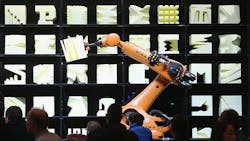If you think robots really are going to take all the jobs, then owning one of the world’s biggest robot-makers would seem a smart strategic move.
So the offer by Chinese consumer appliance group Midea for a probable majority stake in Germany’s Kuka is logical — even if the 60% premium is outlandish by the normal standards of takeover deals.
Four companies — Germany’s Kuka, Switzerland’s ABB and Japan’s Fanuc and Yaskawa Electric — dominate the market for industrial robots. If you want an experienced robotics group with a global footprint and top-notch technology, you don’t have many options. ABB’s robot arm is a core part of the Swiss conglomerate, while Fanuc is famously independent and secretive.
Midea’s stake-building is understandable. The company needs to diversify as growth slows and competition intensifies in the Chinese appliance market. It has a 17.1% share of that, more than double the 7.9% for Haier, according to Euromonitor. However, sales of air-conditioners, Midea’s best-selling product, are slowing as appliance market penetration reaches saturation across the country.
Adding robotics exposure makes sense, as rising Chinese labor costs are expected to drive a big increase in factory automation there. At present, China uses much less automated manufacturing than more developed economies such as South Korea and Germany.
China’s robot sales rose 16% last year, according to the International Federation of Robotics, which predicts that by 2018 it will account for more than one third of industrial robots installed worldwide.
So you can see the strategic sense of a Kuka deal. But it still begs the question: why didn’t Silicon Valley jump in here? Midea’s offer values Kuka’s equity at 4.5 billion euros ($5.05 billion), chump change for the likes of Google, Apple or Amazon. And yes, that whacking great premium is surely designed to see off any potential white knights, but — just like China — the U.S. tech giants aren’t restricted by the usual rules of corporate finance.
There’s been a lot of big talk there about robotics, but besides Amazon’s clever acquisition of Kiva, which makes robots that whizz around its logistics centers, we’ve seen little fruitful action. In March, Google beat a partial retreat by putting its Boston Dynamics unit up for sale.
Of course, the U.S. reigns supreme in software, increasingly central to the success of robotics. But if you want to own the future, you’ll have to marry that expertise to intelligent hardware. And it’s here where Kuka excels.
The German company has branched out beyond its car-plant robot roots to other sectors, including electronics and medical applications. It’s taking a run at the Internet of Things by making its machines easier to program. Its lightweight model called the iiwa is a technological wonder that can work side-by-side with humans, without a safety cage.
If you’d bought a share in Kuka at the start of 2010 and reinvested the dividends until mid-August, when Midea first took a stake, you’d have made a 540% return. Evidence perhaps that Kuka CEO Till Reuter, a former banker, is on to something.
So why the absence of interest from Silicon Valley? One barrier was doubtless Kuka’s shareholder structure. Voith, a German engineering group, has a 25% stake and entrepreneur Friedhelm Loh has 8.5%. U.S. tech companies aren’t known for sharing, though Midea seems happy enough to have other shareholders on board.
Still, if Voith and Loh decide eventually that they’ve had enough, Midea will have snared a jewel of German industry. When the robots have taken over in a few decades time, it’s unlikely we’ll be talking about the takeover price.
By Chris Bryant and Nisha Gopalan
